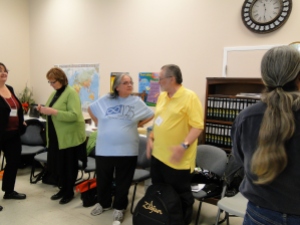Strengthening Aboriginal Relationship Project summary
While we’re in updating mode, here’s a summary of how the “Strengthening Aboriginal Relationship Project” went. The project made up the first part of the spring Pastoral Care Year learning circle, and was held at the North End Stella Community Ministry in Winnipeg. Here’s Ted’s wrap-up:
The spring 2012 learning circle, March 14-29, of the Centre for Christian Studies (CCS) involved fifteen students for diaconal ministry and CCS program staff in an exploration of pastoral care themes. Three days of this educational time were devoted to intentional connection with the First Nations community as we explored topics in pastoral care accompanied by two indigenous elders, five students and staff from the Sandy-Saulteaux Spiritual Centre, four members of the North End (Stella) Community, and four aboriginal workshop leaders. From March 15-17, 2012, a series of workshops/teachings, were facilitated by aboriginal leaders, at the North End (Stella) Community Ministry, and the offices of the All Native Circle Conference, in Winnipeg.
We consider that our purpose – to strengthen diaconal students’ understanding and appreciation for aboriginal culture and worldview, their awareness and sensitivity toward the history of colonialism and church mission, and their compassion and ability to respond in specific areas of pastoral concern – was met in ways that touched the students deeply and contributed to their hope and vision for meaningful, respectful, and authentic intercultural dialogue. One CCS student commented in her evaluation, “I will take these teachings into my life and ministry…It was a feast that I will digest for a long time.”
The three days of workshops integrated community building, and teachings and ceremonies from traditional aboriginal spirituality. As well, small group outings in the neighbourhood included opportunities to visit First Nations services and community development projects. Throughout the project First Nations elders were present sharing their wisdom and guidance formally in the learning circle and informally over meals and breaks. We addressed issues related to addictions, mental health, suicide and corrections/ institutionalization — concerns faced in these communities as a result of colonialism and residential schools — while upholding the rich spirituality and insights of indigenous culture.

We were blessed by amazing leadership. An exploration of the seven sacred teachings — love, respect, courage, honesty, wisdom, humility, truth – and their connections to pastoral care was led by our elders, Stan McKay and Barbara Shoomski. The National Indigenous Anglican Bishop, Mark MacDonald, offered reflection on the legacy of colonialism and residential schools from a thought-provoking and courageous perspective. Roman Catholic deacon, story-teller, and successful author of several books about Nanabosho, Joe McLellan, artfully and playfully led us through some of the teachings of the trickster. Nanette McKay, a United Church minister working in Child and Family Services, raised challenging questions about the systems and structures built around the care and treatment of aboriginal young people in Canadian society. Melody McKellar, aboriginal elder at the Selkirk Mental Health Centre, shared teaching about the four-legged, feathered and finned creatures in relation to pastoral identity and work in mental health. To close, participants shared their thoughts and learnings in a talking circle, revealing a strong sense of solidarity with one another and powerful integration of learning.






